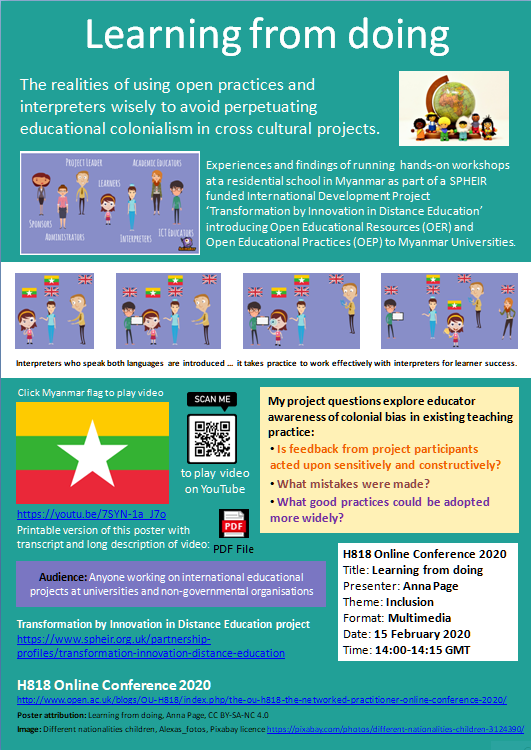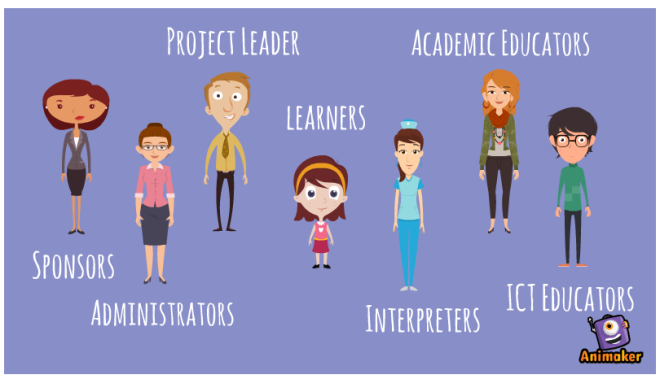I am currently studying again, after a long break since my undergraduate degree and two subsequent short courses (all with The Open University).
I’ve just completed H880 Technology Enhanced Learning (an excellent module which I really enjoyed) and am half way through H818 The Networked Practitioner.
Part of what H818 students are asked to do is a presentation in the H818 online conference (13, 15 and 17 February 2020) about the projects we have each been developing as an activity which runs throughout the module. Our assignments are designed to help us work towards the online conference presentation and encourage online networking with other H818 students in the module forums, OpenStudio and our wider networks to help us develop our networking skills for education, project ideas and learn from each other. This involved helping each other with technical challenges of learning to use new multimedia tools. In my case, I was learning to use Animaker, an online video animation tool, to create a short video to embed in my conference poster.
Part of the challenge for this poster was to make it more than just a printable paper poster of text and images, it had to include some other type of multimedia and be as accessible as possible. Unlike most conference posters, which explain elements of a research project clearly in some detail, these posters are a means of promoting our presentations to encourage people to attend so they can find out more (they still have to explain the project clearly and be engaging). An image of the poster is displayed below.

Learning from doing – image of poster promoting my H818 The Networked Practitioner Conference presentation
Below is the link to the powerpoint version of the poster, which has the video embedded (behind the Myanmar flag). The video can also be reached via the URL just below the flag or by scanning the QR code, both of which should lead to the video hosted on YouTube.
I’ve tried uploading the interactive version of the poster to Slideshare, but unfortunately the embedded video function was stripped out by Slideshare, hence the powerpoint version hosted in this blog post. So I posted the printable version on Slideshare instead to help give the poster wider reach.
H818 TMA02 part 1 Anna Page A0 poster (powerpoint)
I have embedded the YouTube video to play in this blog post.
I have provided a printable version of the poster as a downloadable PDF file – this not only includes the poster image but also the video transcript and a long description of the action in the video, to make it more accessible. The whole thing is in English, however with the provision of a transcript, the following can be done:
- translation software could be used to translate the text into other languages,
- screen reader software should be able to read it to anyone with a visual impairment,
- anyone with a hearing impairment will have access to the audio soundtrack of the video
H818 TMA02 part 1 Anna Page printable poster (PDF)
My conference abstract is below.
Feedback on the poster and abstract is very welcome (please comment on this post):
- Would you be interested in attending my presentation based on what I’ve shared in the poster and abstract, even if this isn’t a topic you might know about?
- Does the video embedded in the poster play for you (after downloading the Powerpoint file) or did you use the YouTube link or the QR code to access the video?
A rabbit in the headlights! Learning from doing: open practices, interpreters and educational colonialism
The UNESCO Sustainable Development Goals for 2030 (UNESCOa, n.d.) challenge educators to develop inclusive, sustainable educational practices for supporting diversity and equity in different cultural situations. Potentially Open Educational Resources (OER) and Open Educational Practices (OEP) could help realise these goals (Lane, 2017; Perryman & de los Arcos, 2016), if the practices used recognise and accommodate the inclusion paradoxes of open education. These include assumptions about using Global North technology hosting OER and MOOCs as an “unproblematic solution to educational demands” (Adam, 2019) in the Global South or lack of participation and learner behaviour guidance, which amplifies deference to Global North knowledge, resulting in “dependency and inequality” (Trotter & Hodgkinson-Williams, 2018). Adopting thoughtful, culturally supportive Open Educational Practices (OEP), which includes feedback and evaluation for improvement, can help develop learner critical thinking, digital literacy skills and build learner agency to contribute more equitably, while also developing and extending educator approaches to inclusive practice.
The H818 project will produce short animated videos illustrating good practice examples in cross cultural education situations; to be published as OER on YouTube. The pilot video for this presentation, illustrating the inclusion of interpreters to improve communication between educators and learners aims to show the initial ‘rabbit in the headlights’ discomfort for tutors new to working with learners with different languages, educational cultures and pedagogical expectations.
The H818 presentation will focus on the realities of using open practices and interpreters wisely to avoid perpetuating educational colonialism in cross cultural projects, especially experiences, observations, findings and feedback from running workshops at a Myanmar residential school, part of SPHEIR funded International Development Project called ‘Transformation by Innovation in Distance Education’ (TIDE) which is introducing OER and OEP to Myanmar Universities. The H818 project video outputs could be used by TIDE participants (tutors, interpreters and learners) to inform their practice in cross cultural situations as the project works towards consolidating and sustaining inclusive, innovative pedagogical practice in Myanmar Universities.
The presentation will briefly describe the Myanmar Higher Education educational context and approaches of the wider TIDE project before focussing on issues encountered during hands-on workshops about OER and learning to use OER creation tools at the face-to-face TIDE project residential school. It will explain the evolving approaches and techniques used in the workshops, especially educators learning to collaborate effectively with interpreters to make sessions more inclusive and engaging for everyone involved, as learners, interpreters and educators learned from doing and observing each other’s approaches.
These questions about educator awareness of colonial bias in existing teaching practice will be explored.
• Is feedback from project participants acted upon sensitively and constructively?
• What mistakes were made?
• What good practices could be adopted more widely?
The findings will inform video content and topics.
Some video production considerations and inclusive practice decisions will be briefly mentioned in the presentation, which will interest anyone working on international educational projects at universities and non-governmental organisations.
References
Adam, T. (2019) ‘Digital neocolonialism and massive open online courses (MOOCs): colonial pasts and neoliberal futures’, Learning, Media and Technology Volume 44, 2019 – Issue 3: Global Technologies, Local Practices. Available at https://www.tandfonline.com/toc/cjem20/44/3 (accessed 13 November 2019)
Lane, A. (2017) ‘Open Education and the Sustainable Development Goals: Making Change Happen [1464]’, Paper presented at the OER17 conference ‘The Politics of Open’, 5-6 April 2017, London, UK. Available at https://oer17.oerconf.org/sessions/open-education-and-the-sustainable-development-goals-making-change-happen-1464/#gref (Accessed 13 November 2019)
Perryman, L-A. & de los Arcos, B. (2016). Women’s empowerment through openness: OER, OEP and the Sustainable Development Goals. Open Praxis, 8(2) pp. 163–180. Available at https://openpraxis.org/index.php/OpenPraxis/article/view/289/206 (Accessed 13 November 2019)
UNESCOa (n.d.) Transforming our world: the 2030 Agenda for Sustainable Development [online]. Available at https://sustainabledevelopment.un.org/post2015/transformingourworld (Accessed 12 November 2019)
Website
TIDE – Transformation by Innovation in Distance Education project (2017-2021). Strategic Partnerships for Higher Education Innovation and Reform [online]. Available at https://www.spheir.org.uk/partnership-profiles/transformation-innovation-distance-education (accessed 30 December 2019)
The contents of this blog post has been created and shared using a Creative Commons ShareAlike Non-commercial licence which means others can remix, tweak and build upon this work non-commercially as long as they credit me and licence their new creations under the identical terms. If you reuse any part of this blog post including photos or text please use the following attribution to credit me: CC BY-NC-SA by Anna C Page https://annacpage.wordpress.com/2020/01/15/h818-networked-practitioner-conference-a-rabbit-in-the-headlights/
For more information about Creative Commons licences see https://creativecommons.org/

